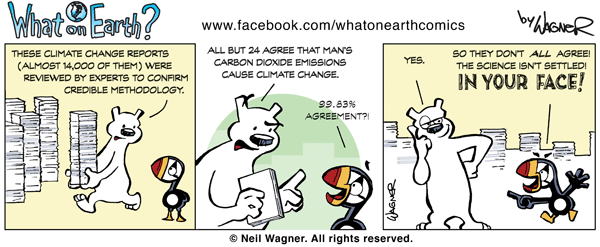

A recent analysis of papers appearing in peer-reviewed science journals shows published scientists to be virtually unanimous in their agreement that human-produced carbon dioxide emissions are a significant cause of global warming. You are free to disagree with my characterization of the consensus as "virtually unanimous," if you feel 99.83 percent doesn't qualify. There are, after all, almost two-tenths of one percent who dissent from the majority assessment.
Oberlin College geologist Dr. James L. Powell reviewed 13,950 papers published between January, 1991 and early November, 2012, and found that a mere 24 of them dissented. That's .17 percent. 1 out of every 581. Powell further makes the point that those 24 were, on average, the least cited of the papers, saying, "Of one thing we can be certain: had any of these articles presented the magic bullet that falsifies human-caused global warming, that article would be on its way to becoming one of the most-cited in the history of science."
This kind of finding is not new, though. A smaller meta-study, conducted by Naomi Oreskes in 2005, reviewed 985 papers published between 1993 and 2003, and found that none disagreed with the consensus about man-made climate change.
The Powell findings alone represent the work of 33,690 authors. But what kind of consensus would you find if you skipped reading thoroughly vetted research papers and just walked up to members of the climate science community to ask them their convictions? Not shockingly, the results are very similar. A 2010 survey in the Proceedings of the National Academy of Sciences asked some questions of "1,372 climate researchers... most actively publishing in the field..." and found that 97-98 percent accepted the idea of anthropogenic climate change. Further, the University of Illinois conducted a very similar survey in 2009 and came away with -- you guessed it -- similar results. 97 percent agreed man was warming the planet.
So what do these overwhelming statistics mean? Let me put it this way: Your odds of knowing someone who believes aliens walk amongst us disguised as humans are twenty times greater than finding a climate skeptic in a group of climate scientists. Seriously.
And I'll bet the aliens would agree with the climate consensus!
Check out What on Earth at Science Friday
Like "What on Earth?" on Facebook.
Become a Fan here at The Huffington Post.